
The Progressive Conservative Party of Canada was a centre to centre-right federal political party in Canada that existed from 1942 to 2003.

The General Confederation of Labour is a national trade union center, founded in 1895 in the city of Limoges. It is the first of the five major French confederations of trade unions.

The 1988 Canadian federal election was held on November 21, 1988, to elect members to the House of Commons of Canada of the 34th Parliament of Canada. It was an election largely fought on a single issue: the Canada–United States Free Trade Agreement (CUSFTA); the Progressive Conservative Party campaigned in favour of it whereas the Liberal Party and the New Democratic Party (NDP) campaigned against it.
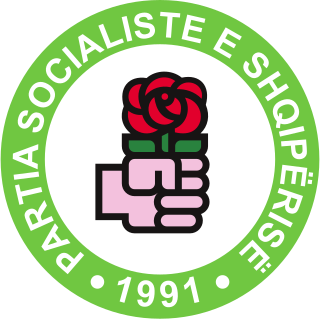
The Socialist Party of Albania is a social-democratic political party in Albania. It has been described as centre-left. It was founded on 13 June 1991. The PS is an associate of the Party of European Socialists and a member of the Socialist International, and holds pro-European views.
The Albanian National Front Party is a nationalist political party in Albania, Kosovo, and North Macedonia.

The Alliance for the Future of Kosovo is a right-wing political party in Kosovo.
Regular elections in Albania are mandated by the Constitution and legislation enacted by Parliament. The Parliament (Kuvendi) has 140 members elected for four-year terms. The electoral system is open list proportional representation. There are 12 multi-member constituencies corresponding to the country's 12 administrative regions. Within any constituency, parties must meet a threshold of 3 percent of votes, and pre-election coalitions must meet a threshold of 5 percent of votes.

Ilir Rexhep Meta is an Albanian politician. He served as the president of Albania from 24 July 2017 to 24 July 2022.

Marie Louise "Mia" De Vits is a Belgian politician.
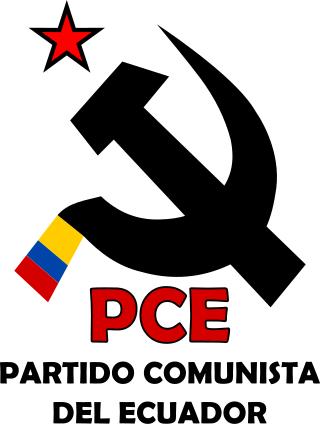
Communist Party of Ecuador is a communist party in Ecuador. It was formed in 1925 as the Socialist Party. The party publishes El Pueblo, the general secretary is Winston Alarcón and the youth wing of the PCE is the Communist Youth of Ecuador.
The Union of the Independent Trade Unions of Albania (BSPSH), is a National Confederation of Trade unions in Albania. It was established in 1991 and held its first national conference in February, 1992. It has an estimated membership of 85,000.

The Italian General Confederation of Labour is a national trade union centre in Italy. It was formed by an agreement between socialists, communists, and Christian democrats in the "Pact of Rome" of June 1944. In 1950, socialists and Christian democrats split forming UIL and CISL, and since then the CGIL has been influenced by the Italian Communist Party (PCI) and until recent years by its political heirs: the Democratic Party of the Left (PDS), the Democrats of the Left (DS) and currently the Democratic Party (PD).
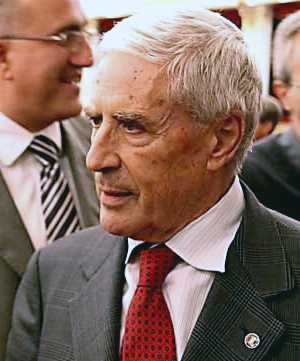
Franco Marini was an Italian politician and a prominent member of the centre-left Democratic Party. From 2006 to 2008, he was the president of the Senate.
Trade unions in South Africa has a history dating back to the 1880s. From the beginning unions could be viewed as a reflection of the racial disunity of the country, with the earliest unions being predominantly for white workers. Through the turbulent years of 1948–1991 trade unions played an important part in developing political and economic resistance, and eventually were one of the driving forces in realising the transition to an inclusive democratic government.
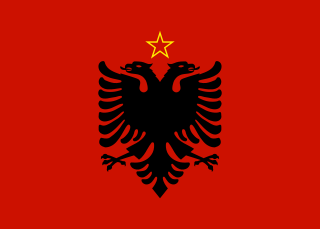
The People's Socialist Republic of Albania, officially the People's Republic of Albania from 1946 until 1976, was the one-party communist state in Albania from 1946 to 1991. It succeeded the Democratic Government of Albania (1944–1946).
Trade unions in Albania have had an unstable existence in recent decades, mirroring the regional political turbulance in Albania. Since the 1991 defeat of the Albanian Party of Labour (APL), independent trade unions have asserted themselves, with two main national trade union centres; the United Independent Albanian Trade Unions (BSPSh) and the Confederation of Trade Unions (KSSh).

Albania–United States relations are diplomatic relations between the Republic of Albania and the United States of America. Relations were first established in 1912, following Albania's independence from the Ottoman Empire, ending in 1939 due to German and Italian occupation in the Second World War, and re-established in 1991 after the fall of communism in Albania and the dissolution of the Soviet Union.
In 1991, the Socialist Party of Albania, with specific social democratic ideology took control of the country through democratic elections. One year later the Democratic Party of Albania won the new elections. After 1990, Albania has been seeking a closer relationship with the West. What followed were deliberate programs of economic and democratic reform, but the implementation of capitalism led to the proliferation of pyramid schemes. Chaos in late 1996 to early 1997, as a result of the collapse of these pyramid schemes, alarmed the world and prompted the influx of international peacekeeping forces. In 1995, Albania was accepted into the Council of Europe and requested membership in NATO and is a potential candidate country for accession to the European Union. The workforce of Albania has continued to emigrate to Western countries, especially Greece and Italy.
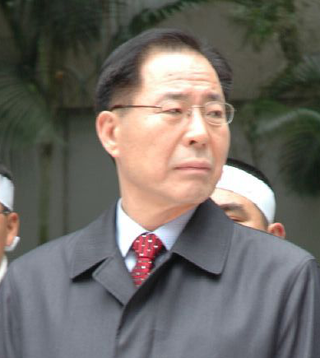
Kwon Young-ghil is a South Korean politician, journalist, and trade unionist. He was a founding member of the People's Victory 21 and Democratic Labour Party.

The Brazilian Workers' Confederation was the first national trade union center in Brazil, founded in 1908, under the bases of agreement of the First Brazilian Workers' Congress of 1906. Through its newspaper, A Voz do Trabalhador, it allowed a certain coordination and exchange of information within the Brazilian worker movement at the national level. The COB was formed by national industry and craft federations, local and state unions, unions isolated in places where there were no federations and non-federated industries.














